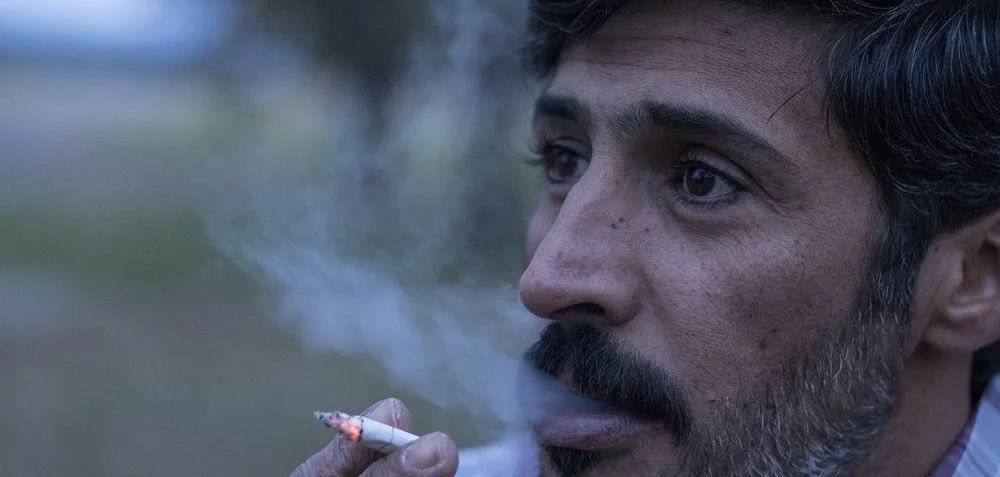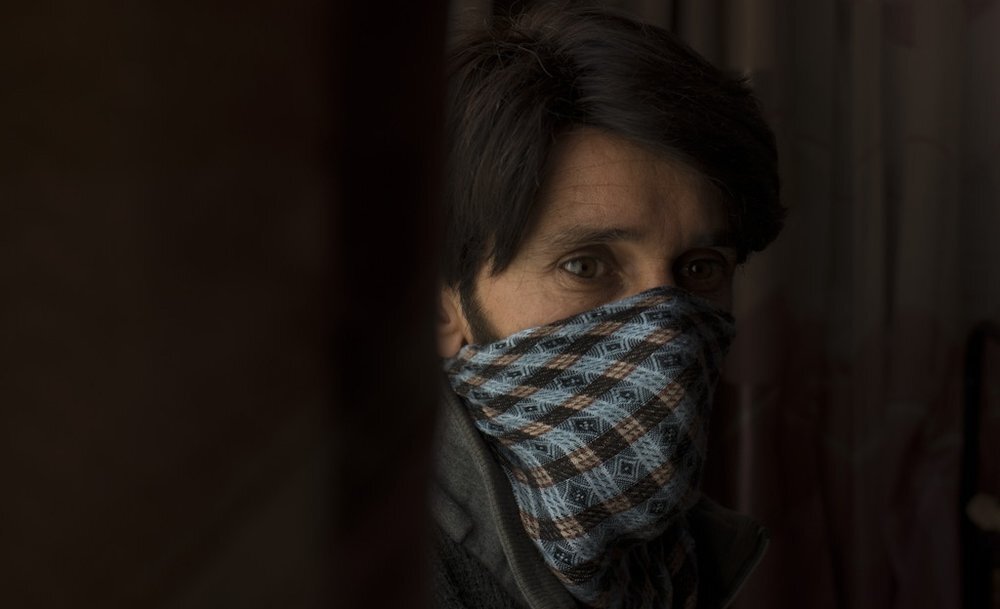The Interpreters
The film follows Iraqi and Afghan interpreters who worked with U.S. forces, and who are now targeted by insurgents as a result. While some have reached safety, others are stuck in hiding—and those with no other hope have set out for Europe and the U.S. with the help of smugglers.
About
More than 50,000 local interpreters helped protect U.S. troops on the ground in Iraq and Afghanistan, enabling soldiers to communicate with the local population. But those who took the job were often considered traitors.
Phillip Morris, whose chain-smoking earned him the nickname, is a central character in the film. His warm, contagious laugh belies the dangerous work he undertook for four years. He served alongside Paul Braun, a sergeant in the Minnesota National Guard who became his best friend. After coalition forces withdrew in 2011, Phillip and his family came under threat.
Back in Minneapolis, Paul works tirelessly to get Phillip to safety. In 2008, the U.S. created the Special Immigrant Visa (SIV) program to help interpreters like Philip get to safety. However, the process has been marred by long delays and backlogs. So far, only around 14,000 interpreters have received visas, counting for just a fraction of the tens of thousands who have been left behind. In addition, growing anti-refugee rhetoric has put the future of the SIV program in jeopardy.
Phillip is lucky enough to have an American soldier advocating on his behalf, and is finally able to make it to the U.S. in 2013. However, his family’s paperwork is delayed, and they’re forced to stay behind in Iraq amidst the rising threat of ISIS. While Phillip acclimates to life in America, he waits anxiously for his family to join him. And eventually he must go back to complete their paperwork, once again facing the threat of being a marked man in his country.
Meanwhile, in Afghanistan, many interpreters are living in hiding with their families while they wait for their visas to be processed. Malik, who is still an active interpreter with the Americans at the Air Force base in Kabul, has been waiting for his SIV for nearly four years. Somehow, he has the security clearance to continue working on the base alongside U.S. troops, while still being stuck in the security review stage of the visa process. Every trip back and forth between the bases is dangerous. Fearing for his life, Malik moves with his wife and two children from his father-in-law’s house to his sister’s house every other week.
Mujtaba is another Afghan interpreter who worked with the army and the DEA fighting drug traffickers. But the danger is too great. He decides he can’t wait any longer for the SIV to come. Mujtaba leaves with his family for Turkey. They attempt to cross the Aegean Sea from Turkey to Greece with the help of smugglers, but a tragic accident sets him on a path he never imagined.
The stories of these three interpreters weave together over the course of two years, following them as they struggle for safety in the aftermath of war.
The Team
Andrés Caballero (Co-Director, Producer)
Andrés Caballero is a bi-coastal filmmaker, journalist and public radio producer. He’s currently a producer with NPR's Latino USA and his stories have appeared on NPR’s Morning Edition, Weekend Edition, PBS, Deutsche Welle and other media outlets. He produced “The Military Voices” series for StoryCorps, about military personnel who served in post 9/11 conflicts. Andres is a former NPR/Above the Fray fellow, where he reported stories from Cameroon and the Central African Republic. He co-directed “Gaucho del Norte” (2015), an observational documentary that follows the journey of a Patagonian immigrant sheepherder recruited to work in the American west. Andres is also a 2016 MacArthur Documentary Grant recipient for “The Interpreters,” a feature length documentary about Iraqi and Afghan interpreters who worked with U.S. forces and are now trying to rebuild their lives in the aftermath of war. He currently serves on the board of the Americas Media Initiative, an organization that supports independent filmmakers in Cuba.
Sofian Khan (Co-Director, Producer, Cinematographer)
Sofian Khan is the founder of Capital K Pictures, a New York-based production house. His shorts have appeared on Field of Vision, Al Jazeera, PBS, Fusion, The Atlantic and The Huffington Post. He is a 2016 MacArthur Documentary Grant recipient for “The Interpreters” (2018). Sofian’s first feature “The Dickumentary” (2014) — a definitive history of the penis from its evolution millions of years ago to today — was acquired by Breaking Glass Pictures in the U.S., and made its festival premiere at the Atlanta Film Festival. His second feature “Gaucho Del Norte”(2015) was released shortly after, co-directed with producing partner Andrés Caballero. The film was a Jerome Foundation grant recipient, following South American shepherds who are recruited to work in the American west. It premiered at the 2015 Big Sky Documentary Film Festival, and subsequently aired on PBS’ America ReFramed series. Currently Sofian is producing “An Act of Worship,” based on a short film about the travel ban that he co-directed for Field of Vision. The feature-length documentary has received support from the Ford Foundation, the Islamic Scholarship Fund and Mountainfilm’s commitment grant.
Carrie Lozano (Executive Producer)
Carrie Lozano is the Director of the Enterprise Documentary Fund at the International Documentary Association. Carrie previously produced the Academy Award-nominated “The Weather Underground” and directed “The Ballad of Fred Hersch.” She was a senior producer on Al Jazeera America’s Peabody Award-winning “Fault Lines” series, and she is a graduate of the documentary program of UC Berkeley’s Graduate School of Journalism.
Fabián Caballero (Co-Editor)
Fabián Caballero is a freelance videographer and documentary film editor based in New York City. In recent years he has worked with Capital K Pictures on two feature documentary films. He is a co-editor on “The Interpreters” and worked as an assistant editor on “Gaucho del Norte,” a feature-length documentary, which aired on PBS’ America Reframed and premiered at Big Sky Film Festival. He has done work for NPR's Latino USA, NY Post, Cinema Tropical, and LUMA Projects among others.
Simon Taufique (Producer, Composer)
Simon Taufique is a U.K.-born, N.Y.-based, award-winning composer and producer/co-founder of film fund Atomic Features. He co-produced and scored “She’s Lost Control” (2014), CICAE winner at the Berlin Film Festival and two-time Spirit Award nominee. Simon recently wrapped “Imperium” (2016), starring Daniel Radcliffe, on which he also served as producer and composer.
Mark Steele (Producer)
Mark Steele is the VP of Production at Werc Werk Works. Wearing many hats at Wercs, he was the Co-Producer on Lawrence Kasdan’s DARLING COMPANION, Jill Sprecher's THIN ICE, Rob Epstein & Jeffrey Freidman's HOWL, and Todd Solondz's LIFE DURING WARTIME. Mark is an experienced domestic & international business affairs exec, and accomplished Post Producer. Mark has served as a technical and operations guru for many film festivals (e.g. Sundance, Tribeca, Telluride). Mark was a 2013 Trans-Atlantic Partners Producing Fellow and is a member of the Producers Guild of America.
Francisco Bello (Editor)
Francisco Bello studied at the Cooper Union School of Art, and has worked in the post-production of films by Kevin Smith, Michael Moore and George Butler among others. His recent editorial work includes “Summer Sun Winter Moon” (ITVS), “Neither Memory nor Magic,” “Betty la Flaca” (HBO), and “Julieta y Ramon” (Showtime). He launched his production company Ropa Vieja Films LLC in 2007 with “Salim Baba,” which he shot and produced in Kolkata, India. “Salim Baba” has screened at festivals worldwide including Sundance, Telluride, IDFA, Woodstock and Tribeca, and in 2008 was Nominated for an Academy Award® for Best Documentary Short Subject. He has been awarded fellowships from the PBS/WGBH Producer's Academy, the NALIP Producer's Academy and a grant from the Urban Arts Initiative.


















